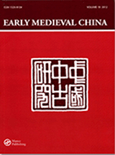
Early Medieval China
Scope & Guideline
Unraveling the Threads of History and Culture
Introduction
Aims and Scopes
- Literary Analysis and Criticism:
The journal emphasizes literary works from the early medieval period, engaging with poetry, prose, and other forms of writing to analyze their historical and cultural significance. - Cultural and Historical Contextualization:
Papers often situate literary and artistic expressions within their broader cultural and historical contexts, examining how these works reflect and influence societal norms and values. - Philosophical and Religious Studies:
The journal explores the philosophical and religious dimensions of early medieval China, including Daoism, Buddhism, and Confucianism, and their interactions within the period. - Interdisciplinary Approaches:
The journal encourages interdisciplinary research, integrating insights from anthropology, musicology, and art history to provide a holistic understanding of the early medieval landscape. - Exploration of Nonhuman Agency:
Recent articles have begun to explore themes of animality and nonhuman perspectives, indicating a growing interest in the roles of nonhuman entities in shaping human narratives.
Trending and Emerging
- Nonhuman Perspectives and Animal Studies:
The exploration of nonhuman agency, particularly in relation to animals and their roles in human narratives, is an emerging theme that offers fresh insights into cultural and literary studies. - Poetic and Musical Intersections:
There is a growing interest in the connections between poetry, performance, and music during the early medieval period, as seen in the examination of musical orthodoxy and poetic forms. - Social Networks and Gossip:
Recent works focusing on the dynamics of social networks, gossip, and anecdotal storytelling highlight the importance of interpersonal relationships and cultural transmission in early medieval society. - Geographical and Metageographical Studies:
The journal is increasingly featuring studies that explore the geographical dimensions of early medieval China, including how spaces and places shape cultural identity and historical narratives. - Ritual and Political Discourse:
A trend towards examining the politicization of rituals and their implications for social order and identity reflects a deeper engagement with the intersections of culture, power, and governance.
Declining or Waning
- Traditional Historical Narratives:
There has been a noticeable decline in articles focusing solely on traditional historical narratives, as scholars increasingly seek nuanced interpretations that incorporate a wider array of perspectives. - Mythological Studies:
While mythological themes were once a focal point, recent publications indicate a waning interest in exploring myths in isolation, favoring instead a more integrated approach that combines myth with historical and cultural analysis. - Ethnographic Comparisons:
The comparative study of early medieval China with other cultures, such as Rome, is appearing less frequently, suggesting a shift towards more localized studies that prioritize internal developments over cross-cultural comparisons.
Similar Journals
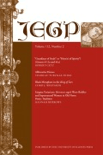
JOURNAL OF ENGLISH AND GERMANIC PHILOLOGY
Cultivating Knowledge in English and Germanic PhilologyJournal of English and Germanic Philology, published by University of Illinois Press, stands as a prestigious forum for scholarly discourse in the fields of linguistics and literary studies. With its ISSN 0363-6941 and an impressive impact factor aligning it within the Q1 and Q2 quartiles in key academic categories, this journal delves into nuanced explorations of both the English and Germanic languages, enriching the understanding of language and its literary frameworks. The journal aims to foster interdisciplinary dialogue, offering cutting-edge research that appeals not only to linguists and literary theorists but also to educators and cultural historians alike. Although the journal is not open access, its contributions are essential for anyone keen on enhancing their knowledge of linguistic phenomena and literary narratives from these influential linguistic traditions. With a commitment to publishing innovative and rigorous scholarship, the Journal of English and Germanic Philology is a vital resource for academics seeking to advance their work in language and literature.
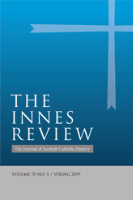
Innes Review
Exploring the intersections of culture, history, and faith.The Innes Review is a distinguished academic journal published by Edinburgh University Press, focusing on the study of culture, history, and religion. With a commitment to advancing scholarly discourse, the journal serves as an essential resource for researchers and professionals alike, providing critical insights and analyses that cater to the diverse interests within Cultural Studies, History, and Religious Studies. Established in 1996 and continuing through 2024, the journal has achieved notable recognition, reflecting its contributions through its Q3 ranking in History and Q4 rankings in Cultural and Religious Studies according to the latest metrics. While it currently operates without an open access model, the Innes Review remains accessible through a variety of academic databases and resources, underpinned by rigorous peer-review processes that ensure high-quality publications. As such, it stands as a vital platform for disseminating innovative research and fostering intellectual engagement within the humanities.
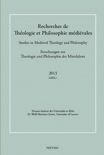
Recherches de Theologie et Philosophie Medievales
Exploring the Depths of Medieval ThoughtRecherches de Theologie et Philosophie Medievales is a distinguished scholarly journal dedicated to the exploration of medieval theology and philosophy, published by PEETERS in Belgium. With an ISSN of 1370-7493 and an E-ISSN of 1783-1717, it has become an essential resource for researchers and scholars within its domain since its inception in 1996. This journal occupies a notable position, recognized in the Q3 category across critical fields such as History, Philosophy, and Religious Studies in 2023, showcasing its valuable contribution to academic discourse. The journal ranks impressively in Scopus, holding positions of #202, #576, and #327 in Religious Studies, History, and Philosophy respectively, placing it in the 68th, 67th, and 59th percentiles. Though it operates under traditional access models, its rigorous peer-reviewed articles provide in-depth analyses and perspectives that are invaluable for students, academics, and professionals alike, making it an indispensable component of medieval studies.
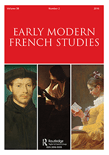
Early Modern French Studies
Exploring the Rich Tapestry of Early Modern French CultureEarly Modern French Studies (ISSN: 2056-3035; E-ISSN: 2056-3043), published by Routledge Journals, Taylor & Francis Ltd, is an essential academic journal that delves into the complexities of early modern French culture, literature, and history. With a focus on interdisciplinary approaches, this journal offers scholars a platform to engage with the evolving dynamics of French studies from 2015 to 2024. Despite its current Q4 ranking in the categories of Cultural Studies, History, and Literature and Literary Theory, Early Modern French Studies seeks to elevate discussions and research that illuminate the richness of the early modern period. While offering traditional subscription options, the journal encourages submissions that challenge prevailing narratives and foster innovative dialogues within the field. This journal is crucial for anyone looking to contribute to or gain insights into the intricate tapestry of early modern French scholarship.

Magnificat Cultura i Literatura Medievals
Exploring the Depths of Medieval Culture and LiteratureMagnificat Cultura i Literatura Medievals, published by UNIV VALENCIA, SERVICIO PUBLICACIONS, is an esteemed academic journal that has been at the forefront of medieval studies since its inception in 2014. With its Open Access model, this journal ensures that cutting-edge research is readily available to scholars and enthusiasts alike, fostering an inclusive academic environment. Based in Spain, it boasts impressive rankings with a Q2 designation in History and a Q1 in Literature and Literary Theory for 2023, indicating its significant contribution to these fields. The journal is indexed by Scopus, achieving top-tier rankings in both Literature and History, and is recognized in the 87th and 72nd percentiles of their respective categories. With a focus on the complexities of medieval culture and literature, Magnificat serves as a vital resource for researchers, professionals, and students dedicated to exploring the rich tapestry of medieval scholarship.

Journal of Early Modern Studies
Connecting Cultures Through Scholarly ResearchJournal of Early Modern Studies is a premier open-access academic journal published by FIRENZE UNIV PRESS, dedicated to advancing scholarly research in various interrelated fields, including Cultural Studies, History, Literature and Literary Theory, Religious Studies, Linguistics and Language, Sociology and Political Science, and the Visual Arts and Performing Arts. Established in 2012, this journal plays a vital role in disseminating critical insights into the complexities of the early modern period, positioning itself among the fast-evolving dialogue within the humanities and social sciences. Notably, it has achieved respectable rankings, with a Q2 quartile in History and Literature for 2023, highlighting its contributions to academia. The Journal's dynamic scope continues to attract an engaged readership from across the globe, aiming to foster interdisciplinary dialogue through high-quality, peer-reviewed research. With a commitment to accessibility, it provides free online access to all published articles, ensuring that knowledge is readily available to researchers, professionals, and students alike. The journal’s ongoing efforts in scholarly excellence reflect its importance in shaping the future of early modern studies.
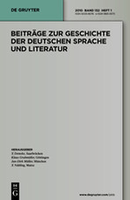
BEITRAGE ZUR GESCHICHTE DER DEUTSCHEN SPRACHE UND LITERATUR
Exploring the Evolution of Language and Literature since 1874BEITRAGE ZUR GESCHICHTE DER DEUTSCHEN SPRACHE UND LITERATUR is a distinguished scholarly journal published by Walter de Gruyter GmbH, focusing on the historical development of the German language and literature. With an ISSN of 0005-8076 and an E-ISSN of 1865-9373, this journal has been a pivotal resource for linguistic and literary scholars since its inception in 1874. Hailing from Germany, it serves as a critical platform for understanding the nuanced evolution of Germanic studies, contributing to its categorization in the Q4 and Q3 quartiles in Linguistics and Language and Literature and Literary Theory, respectively, as of 2023. Although not open access, the journal provides invaluable peer-reviewed content that fosters scholarly dialogue and research in its specialized fields, making it an essential read for researchers, professionals, and students dedicated to the richness of German linguistic heritage and literary analysis. The journal's extensive history and commitment to academic excellence position it as a key player in the ongoing discourse within the humanities.

De Medio Aevo
Unveiling the Depths of Cultural and Historical InquiryDe Medio Aevo is a distinguished academic journal published by UNIV COMPLUTENSE MADRID, SERVICIO PUBLICACIONES, dedicated to enriching the fields of Cultural Studies, History, Literature and Literary Theory, Philosophy, Religious Studies, and Visual Arts and Performing Arts. Since its inception in 2012 as an Open Access platform, this Spanish journal has rapidly established its reputation, achieving impressive rankings in various categories with a Q1 classification in Literature and Literary Theory and notable positions in Q2 across other fields as per the 2023 metrics. With an emphasis on rigorous scholarly research, De Medio Aevo seeks to foster the exchange of ideas and insights that reflect the rich tapestry of medieval studies and its ongoing impact on contemporary society. It is an essential resource for researchers, professionals, and students alike, encouraging interdisciplinary dialogue and exploration of the cultural narratives that shape our understanding of history and the arts. Located in Madrid, Spain, the journal is committed to making significant contributions to its fields, with a global reach and a focus on academic excellence.
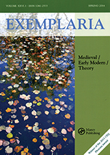
Exemplaria-Medieval Early Modern Theory
Illuminating Complexities of Textual TraditionsExemplaria: Medieval Early Modern Theory is a distinguished journal within the fields of Cultural Studies, Linguistics and Language, and Literature and Literary Theory, published by Routledge Journals, Taylor & Francis Ltd. With an impressive Q1 ranking in Literature and Literary Theory and notable placements in associated disciplines, this journal serves as an essential platform for scholars dedicated to exploring the complexities of medieval and early modern texts and contexts. Established with a vision to stimulate interdisciplinary dialogue, Exemplaria has evolved from its initial years (1989-1995) to a renewed focus (2002-2024), consistently fostering significant contributions that shape contemporary literary discourse. Although currently not open access, the journal ensures broad reach and engagement through its meticulously curated articles, reviews, and critical essays that challenge traditional narratives and advocate for innovative methodologies. With the journal's ISSN 1041-2573 and E-ISSN 1753-3074, researchers, professionals, and students interested in advancing their understanding of literary traditions are encouraged to explore its rich repository of knowledge, which reflects the dynamic interplay between historical texts and modern interpretations.
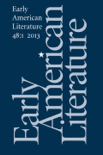
EARLY AMERICAN LITERATURE
Exploring the Roots of American Literary HeritageEARLY AMERICAN LITERATURE, published by the University of North Carolina Press, stands as a pivotal journal in the field of American literary studies. With an ISSN of 0012-8163 and E-ISSN of 1534-147X, this journal invites scholarly discourse and analysis of literary works from the early American period, effectively bridging historical context and contemporary literary theory. The journal has maintained a consistent publication history since 1973, with significant converged years, providing essential insights for researchers and students alike. Ranked Q3 in Literature and Literary Theory with an impressive Scopus rank placing it in the 66th percentile, EARLY AMERICAN LITERATURE remains an essential resource for exploring the intricacies of early American texts and their implications. Although not an open-access journal, its contributions are invaluable for anyone engaging with this rich literary tradition, fostering a deeper understanding of America's cultural and literary heritage.